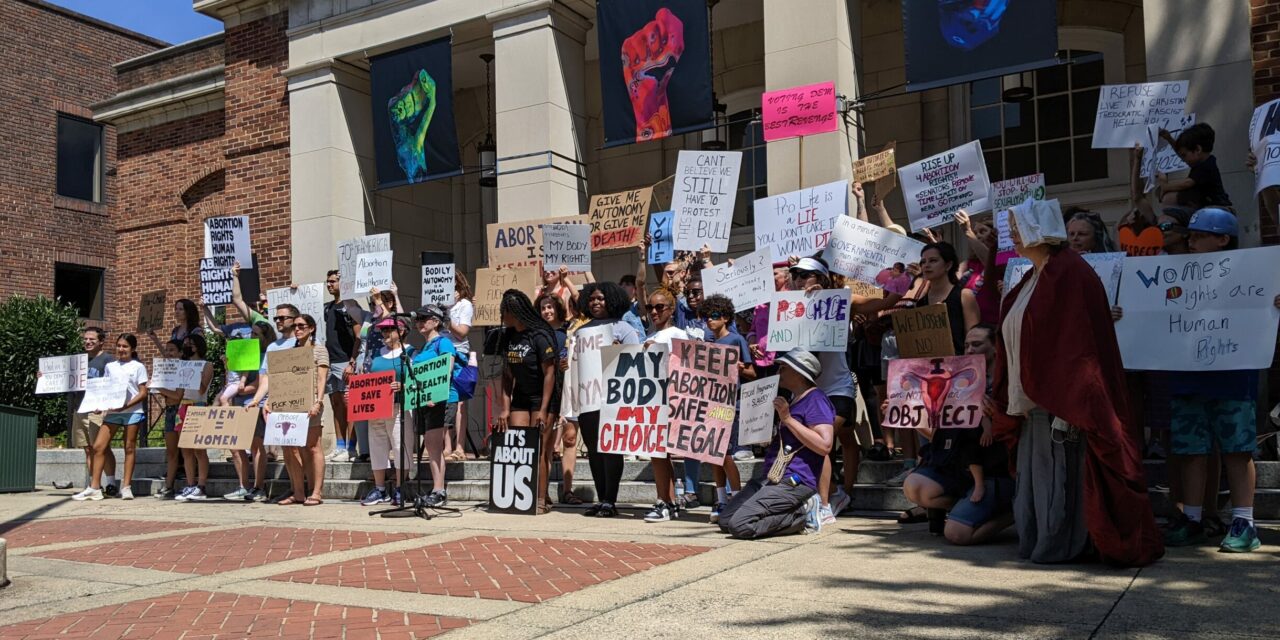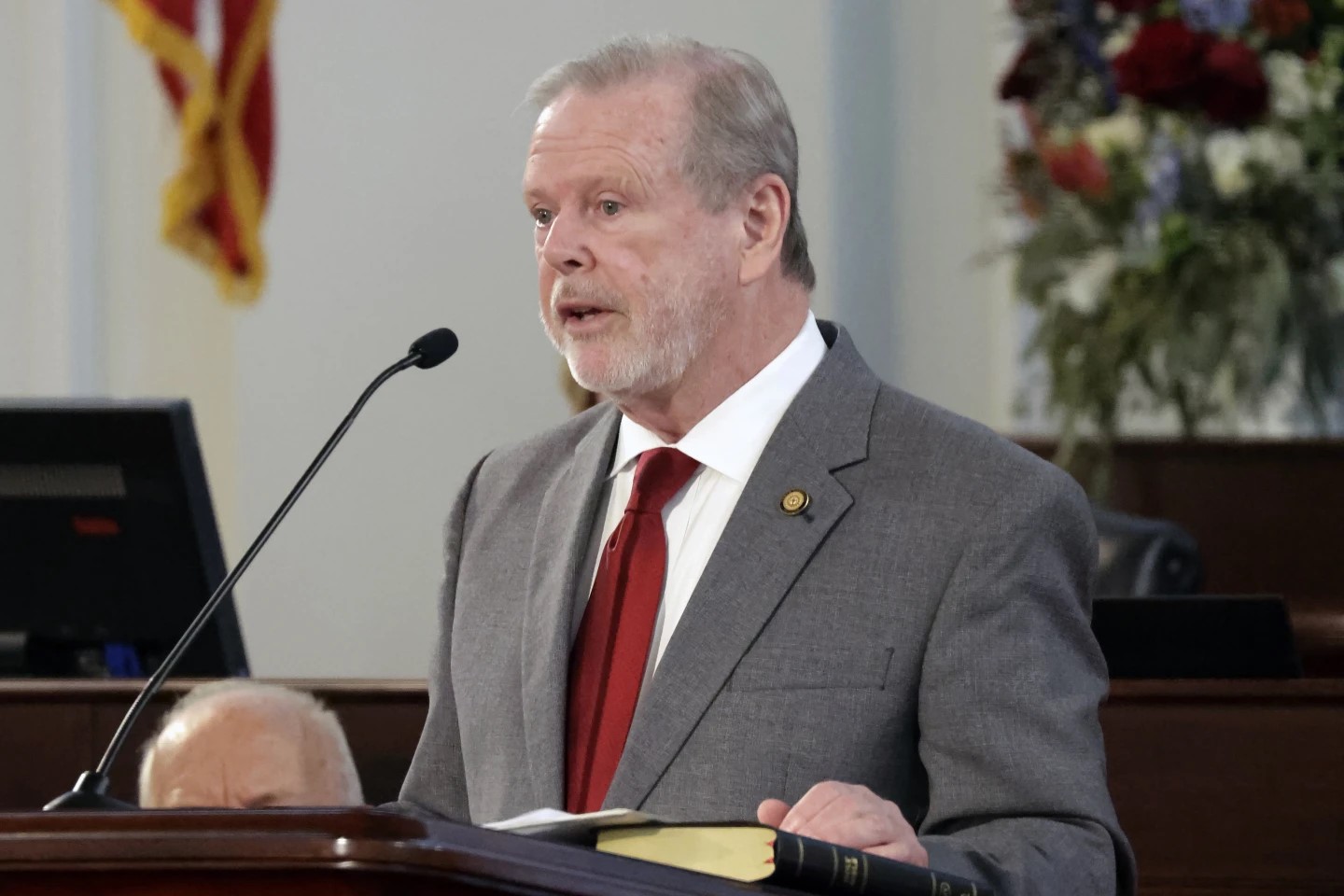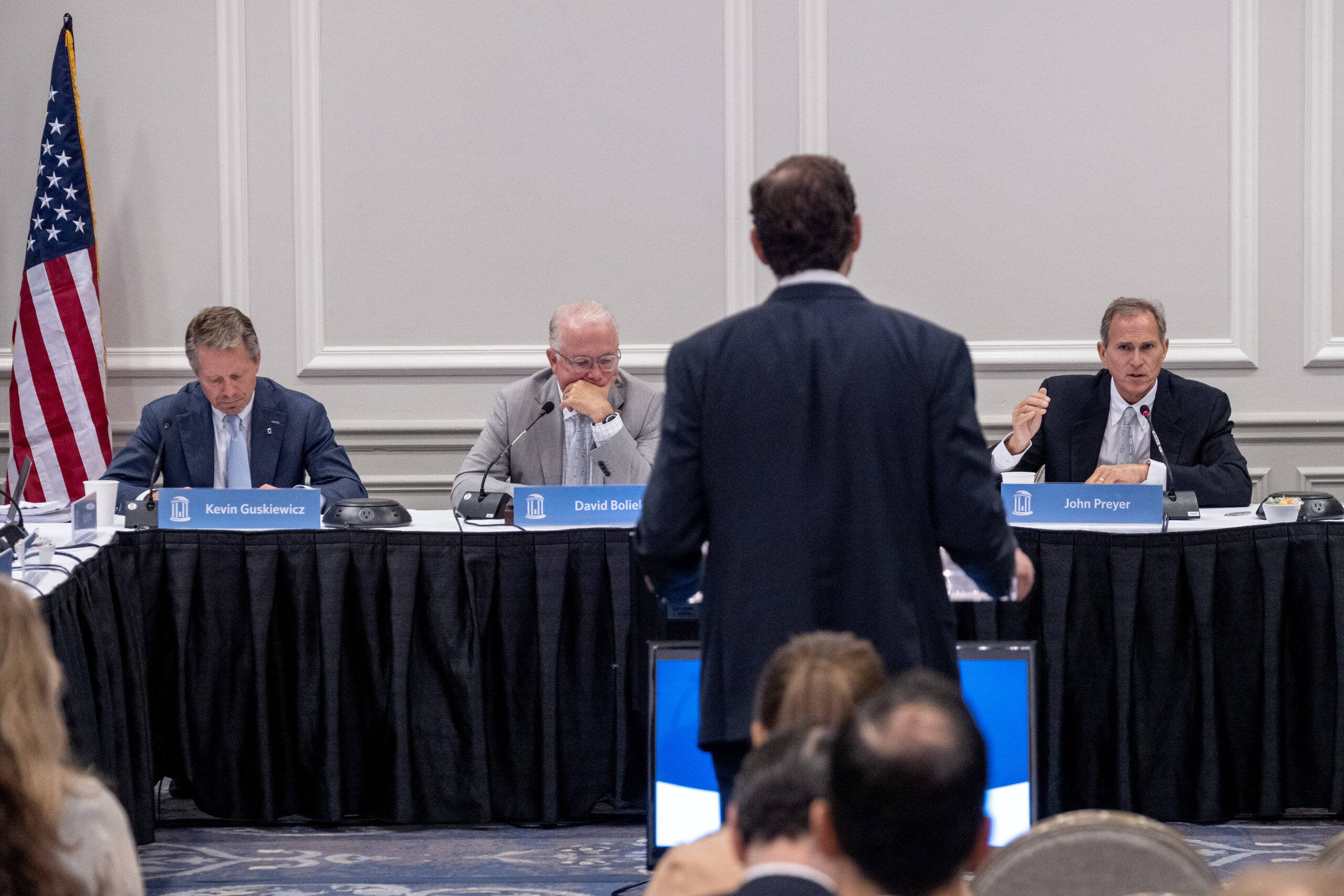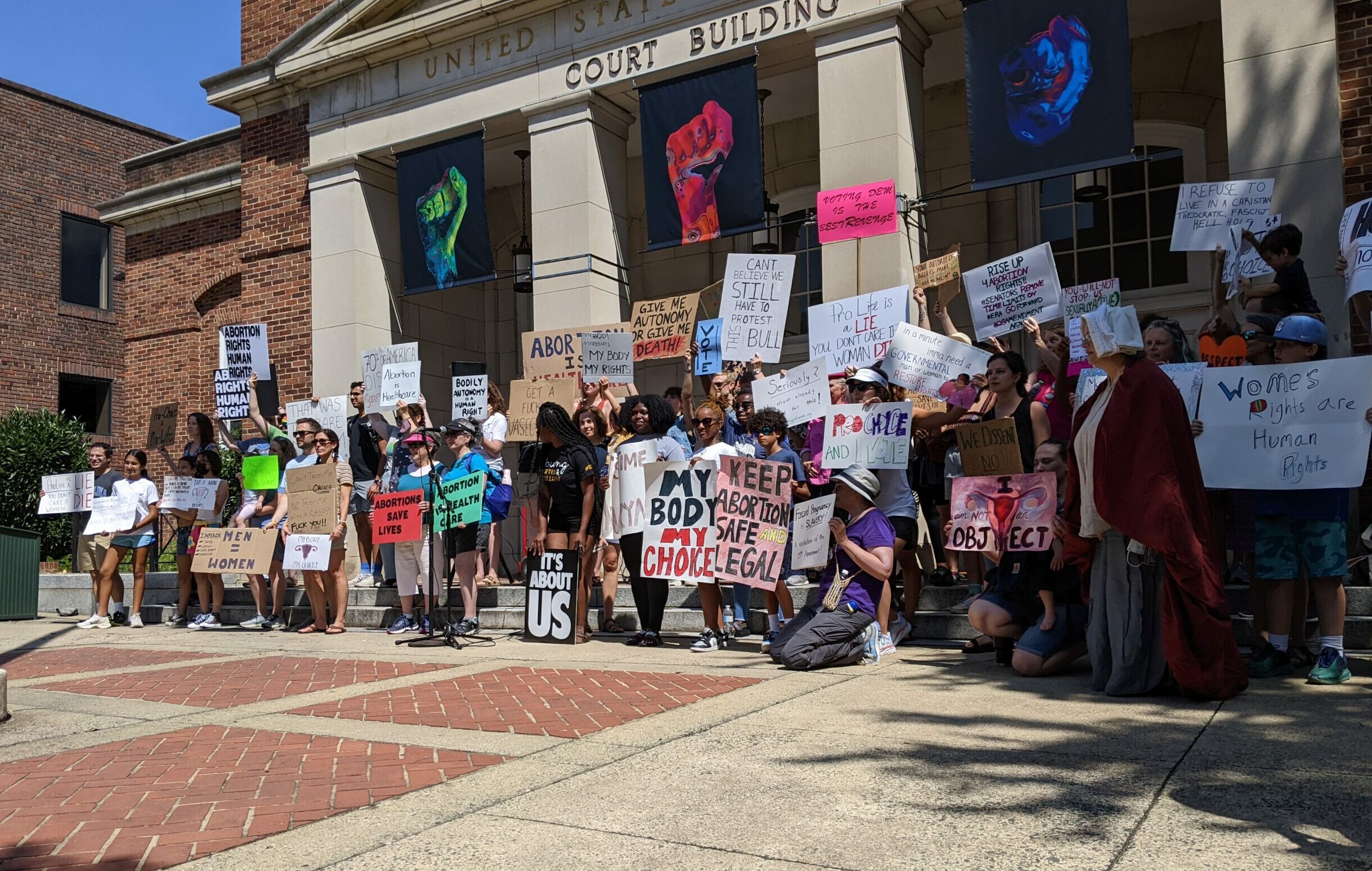To reflect on the year, Chapelboro.com is revisiting some of the top stories that impacted and defined our community’s experience in 2022. These stories and topics affected Chapel Hill, Carrboro and the rest of our region.
Here at Chapelboro, we focus mostly on local news. But in 2022, there was one national story that could not be ignored: the Supreme Court’s June 24 ruling that overturned Roe v. Wade, kicked the abortion issue back to the states, and set off shockwaves nationwide – including here in Orange County.
Roe v. Wade had been a Supreme Court precedent for 49 years, reaffirmed by the Court on multiple occasions; even right-leaning justices like Brett Kavanaugh and Amy Coney Barrett had suggested in their confirmation hearings that Roe was “settled law.” Still, given the Court’s conservative majority, it was not a surprise when the justices agreed to hear arguments in Dobbs v. Jackson Women’s Health Organization, a case that revolved around a Mississippi abortion law that directly defied Roe v. Wade.
What was surprising, though, was an unexpected development in May. In a rare breach of the Court’s vaunted secrecy, a draft opinion was leaked to the press suggesting that the justices were about to issue a sweeping ruling, siding with Mississippi and wiping out Roe.
The leak was contentious enough — but the controversy only spiked when the ruling itself dropped on June 24. “Roe was egregiously wrong from the start,” wrote Samuel Alito in his majority opinion. “It is time to heed the Constitution and return the issue of abortion to the people’s elected representatives.”
The Court’s liberal wing dissented sharply. “Today,” wrote Stephen Breyer, Sonia Sotomayor, and Elena Kagan, “the Court…says that from the very moment of fertilization, a woman has no rights to speak of.”
That was the prevailing opinion locally, as elected officials and other community leaders spoke out sharply against the Court’s decision. State Senator Valerie Foushee called it “a dark day for America,” and Hillsborough Mayor Jenn Weaver agreed. “After decades of forward progress on Constitutional rights, we now have a right stripped away for more than half of the nation’s population,” she wrote. “This is devastating, and bodes more ill.”
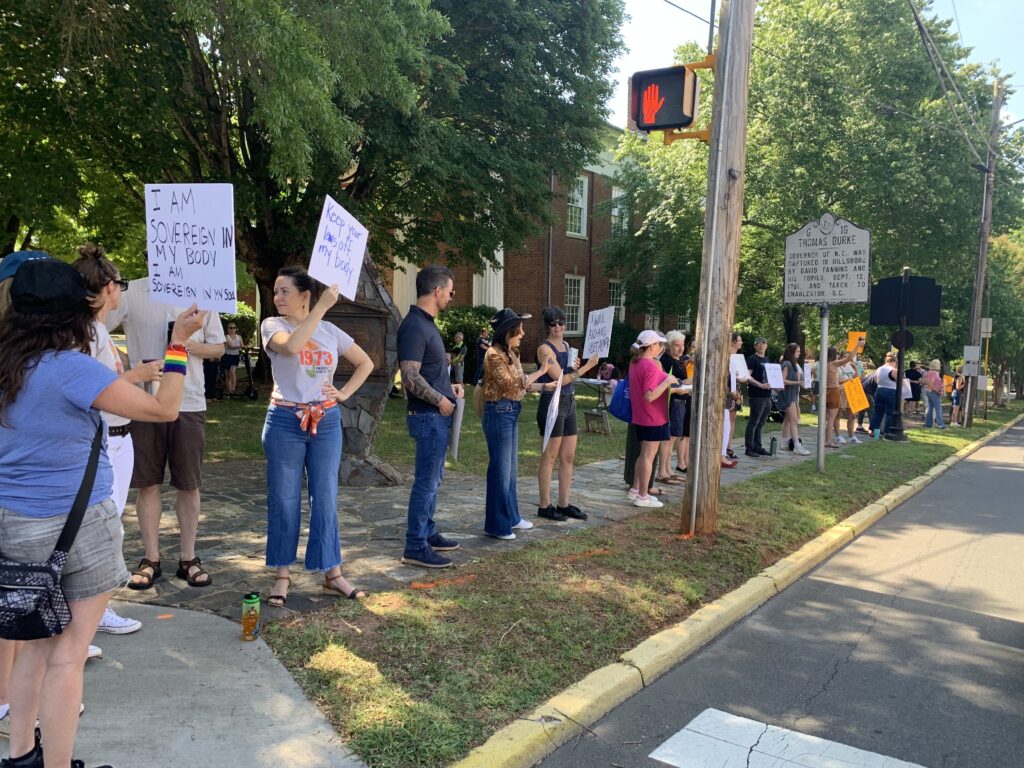
A crowd of demonstrators along Churton Street hold signs advocating for abortion and women’s health on June 27, 2022. People gathered to protest the U.S. Supreme Court’s decision to overturn Roe v. Wade and eliminate federal protection for abortion access.
“More ill” turned out to be quite literal, as medical experts sounded the alarm about the negative health impacts that were likely to result from the restrictive state laws that passed (or were reactivated) in the aftermath of Dobbs. Some of those laws banned abortion even when the procedure was necessary to protect the life or health of the mother. And even when abortion laws made exceptions for the mother’s life or health, those exceptions were often poorly defined, leaving medical providers afraid to act and pregnant women in limbo.
“We just need to be providing evidence-based care to our patients,” said Duke OB-GYN Dr. Beverly Gray. “Am I (going to) have to call up a lawyer to make a decision for a patient? That seems like an extra step that puts people’s lives at risk.”
Fellow Duke OB-GYN Dr. Jonas Swartz agreed. “What degree of medical risk is enough that you decide that it is a medical emergency?” he asked. “What do you define as a threat to maternal life? Is it a 1 percent risk of death? Is it a 30 percent risk? Do you have to wait for someone to be actively dying, actively having their organs shut down? We are trained to provide evidence-based medical care, and this is the only circumstance where I can think of that states are taking away our ability to provide best evidence-based care…
“Prior to Roe v. Wade, there were whole hospital wards filled with women who had septic abortions and had major morbidity and mortality from them,” Swartz added. “When I think about going back to that reality, it really would be a horrible consequence of removing access to safe abortion.”
Health experts also observed that the ruling would likely exacerbate existing health disparities, disproportionately affecting poor women and women of color. “If you’re a Black woman in this country,” said Gray, “your risk of death during pregnancy is three times higher than white women.”
Advocates for domestic violence victims expressed their own concerns. “It’s not just about… the right to give birth or not to give birth,” said Compass Center executive director Christian Adams. “It’s also creating extreme barriers for (victims of) domestic violence and intimate partner violence. Once you have a child with an abuser… it becomes dramatically harder for you to actually walk away from that abuser. And I know this as a survivor myself…
“I think that’s the thing that we’re missing,” Adams added: “survivors and victims (will) really be forced to stay in these situations longer if they’re being forced into these births.”
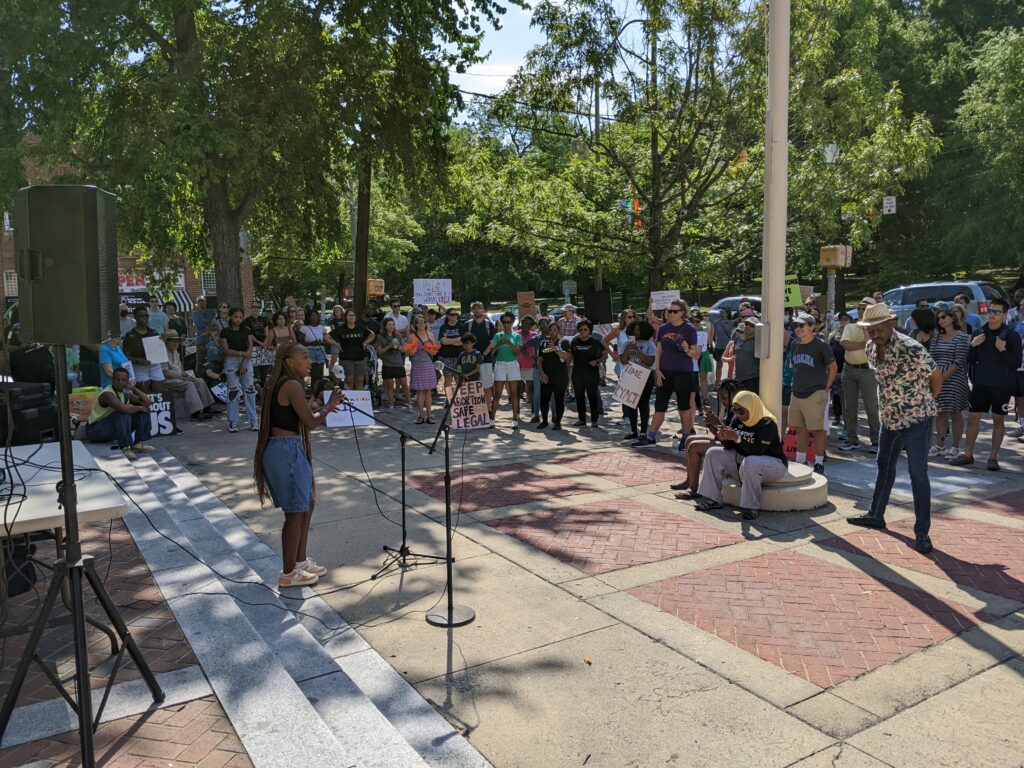
UNC student body president Teddy Vann speaks to the crowd at a Chapel Hill-Carrboro NAACP gathering at Peace and Justice Plaza about defending abortion access.
In North Carolina, the Dobbs ruling led to the reinstatement of a 1973 law banning abortion after 20 weeks of pregnancy — though Democratic Attorney General Josh Stein, an abortion-rights advocate, made waves by recusing himself from defending that law in court. Beyond that, though, the immediate legal impact of Dobbs in North Carolina was muted, as Republican lawmakers elected not to take up the issue any further in 2022. (This may have been good electoral strategy: Republicans performed better in the midterms in North Carolina than they did in the nation as a whole.)
What North Carolina did see, however, was an influx of patients from other states. “I toured our local Planned Parenthood clinic,” State Rep. Graig Meyer told 97.9 The Hill in October, “and they’re seeing people from 13 states, who are coming here because it’s the closest place they can get access to abortion.” Planned Parenthood South Atlantic reported an influx of out-of-state patients across the state — notably in Asheville, where two-thirds of abortion patients in September were non-North Carolinians. The result was a 68 percent increase in abortions between September of 2021 and September of 2022 — and that too had significant health impacts. In a legal brief, Planned Parenthood attorneys wrote that the spike in abortion patients “has exacerbated the long wait times experienced by North Carolinians seeking abortion — forcing them to remain pregnant against their will for longer periods, potentially pushing them past the gestational age limit for a medication abortion, and more.”
And the outcry from the Dobbs decision also had an immediate impact on public discourse, as more and more women chose to attack the stigma surrounding abortion – by telling their own personal stories.
“I am over being silent,” said local activist Lisa Kaylie at a rally in Chapel Hill the day after Dobbs. And she wasn’t alone, as numerous community leaders came forward with their own stories – like Hillsborough Mayor Jenn Weaver, who shared her own story on 97.9 The Hill.
“Abortion is normal, abortion is common, and people have abortions for all kinds of reasons,” she said. “The thought of denying this care to victims of rape or incest or ectopic pregnancies (is) horrific – but the conversation and concern should not end there. There are (many) who, like me, ended their pregnancies because they were not at a place in their lives where they were interested or able to carry a child to term. We have abortions because we want to determine the course of our own lives. I have two beautiful children and a loving spouse, and the life I have today would not exist without having had access to an abortion.”
The fight over abortion rights had an immediate impact on the law and public discourse; it also had a massive impact on politics, rallying left-leaning voters to the polls in a “Roevember” midterm election that had been looking bleak for Democrats. Not only did Democrats outperform expectations nationwide: voters also explicitly rejected anti-abortion referendums in numerous states, even highly conservative states like Kansas and Kentucky.
Nevertheless, the U.S. ends 2022 with far more restrictive abortion laws than it had at the start of the year. And in North Carolina, the biggest fight may be yet to come: with a nearly veto-proof majority in the General Assembly, Republican lawmakers say they’re likely to advance a new anti-abortion bill in 2023. (It remains to be seen how restrictive that bill might be: State House Speaker Tim Moore says he favors a ban on abortion after 6 weeks, but State Senate leader Phil Berger prefers a ban closer to 12 weeks.)
Whatever the General Assembly does, officials in Orange County have already promised to do their part to protect abortion access locally. That includes incoming Orange-Chatham district attorney Jeff Nieman, who pledged during his campaign not to prosecute abortion cases in Orange County, even if the practice is outlawed.
Chapelboro.com does not charge subscription fees, and you can directly support our efforts in local journalism here. Want more of what you see on Chapelboro? Let us bring free local news and community information to you by signing up for our biweekly newsletter.

